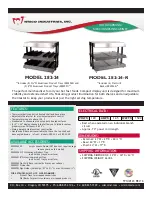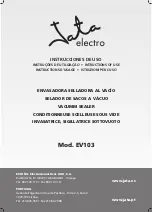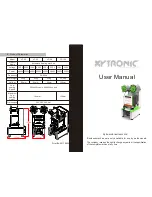
MHC-22 Holding Cabinet Items 86002 & 86003 Service, Installation And Operation Manual
For customer service, call (989) 773-7981, (800) 733-8829, Fax (989) 773-3210, www.mercoproducts.com
14
Maintenance,
continued
Stainless Steel Care and Cleaning
To prevent discoloration or rust on stainless steel several
important steps need to be taken. First, we need to understand
the properties of stainless steel. Stainless steel contains 70-
80% iron, which will rust. It also contains 12-30% chromium,
which forms an invisible passive film over the steel’s surface,
which acts as a shield against corrosion. As long as the
protective layer is intact, the metal is still stainless. If the film
is broken or contaminated, outside elements can begin to
breakdown the steel and begin to form discoloration or rust.
Proper cleaning of stainless steel requires soft cloths or plastic
scouring pads.
NEVER USE STEEL PADS, WIRE BRUSHES OR SCRAPERS!
Cleaning solutions need to be alkaline based or non-chloride
cleaners. Any cleaner containing chlorides will damage
the protective film of the stainless steel. Chlorides are also
commonly found in hard water, salts, and household and
industrial cleaners. If cleaners containing chlorides are used be
sure to rinse repeatedly and dry thoroughly. Routine cleaning
of stainless steel can be done with soap and water. Extreme
stains or grease should be cleaned with a non-abrasive cleaner
and plastic scrub pad. Always rub with the grain of the steel.
There are stainless steel cleaners available which can restore
and preserve the finish of the steels protective layer. Early signs
of stainless steel breakdown are small pits and cracks. If this
has begun, clean thoroughly and start to apply stainless steel
cleaners in attempt to restore the passivity of the steel.
Never use an acid based cleaning solution! Many
food products have an acidic content, which can
deteriorate the finish. Be sure to clean the stainless
steel surfaces of ALL food products. Common items
include, tomatoes, peppers and other vegetables.
Plastic Tray Cleaning
Food-approved detergents can be used if they are diluted per
manufacturer’s directions and adequately rinsed away prior to
high temp drying cycle. Basic alcohols such as isopropyl are
acceptable for hard-to-remove stains. Otherwise, do not use
organic solvents.
Environmental stress cracking has occurred, proper dilution
and rinsing per manufacturers’ directions are mandatory.
CAUTION










































